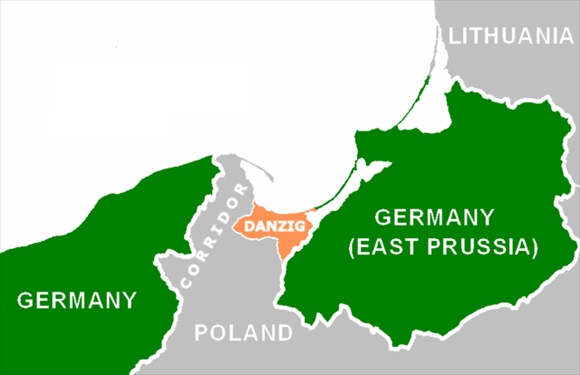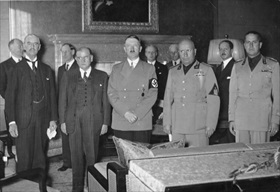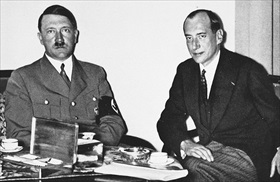POLES DIG IN, NO CONCESSIONS TO HITLER
Warsaw, Poland · May 5, 1939
In 1923 Poland’s Baltic neighbor to the north, Lithuania, unlawfully annexed Memel Territory (now Klaipėda Region in present-day Lithuania) that had been, up to 1918, part of Prussia under Kaiser Wilhelm II. Like the Danzig enclave in Poland and the Saar Territory in the Rhineland, Memel was a League of Nations mandate. On March 20, 1939, Germany demanded Lithuania return Memel to Germany; otherwise, vowed German Foreign Minister Joachim von Ribbentrop, it “will be taken by other means.” Tiny Lithuania prudently complied.
The saber-rattling Memel drama caught world leaders by surprise. Not so the long-festering drama in former Prussian Danzig and the so-called “Polish Corridor.” Ever since the 1919 Versailles Peace Treaty, the “Free City of Danzig” had provided Poland, newly independent after 123 years, access to the Baltic Sea. The problem was, both the corridor and Danzig (now Gdańsk), chiefly populated by ethnic Germans, split Prussia in two (see map below). Encouraged by British Prime Minister Neville Chamberlain and French Premier Édouard Daladier to negotiate a German transit route across the corridor, the Polish foreign minister, nationalist Gen. Józef Beck, responded on this date in 1939: “We in Poland do not know the concept of peace at any price.” The allusion was a diplomatic slap in the face, as both Chamberlain and Daladier were complicit in negotiating Adolf Hitler’s land-grab of Czechoslovakia’s ethnic-German Sudetenland in September 1938.
Chamberlain, on returning from the Munich Conference, infamously asserted that he and Daladier had bought “peace for our time.” Gen. Beck’s hubris may have been based in part on vague Anglo-French assurances of support for his country against potential German aggression following the military occupation of Prague, the Czech capital, two months earlier. These assurances had the most far-reaching and unintended consequences, for they delivered the destinies of Britain and France into Polish hands. By stubbornly refusing to make concessions to Germany over the status of the Danzig enclave and the overland routes through Polish territory, Poland and the Western democracies moved closer to the flashpoint day of September 1, 1939, when Hitler unleashed his legions not only on Poland, but soon on the whole continent, where they sowed devastation, death, enslavement, and impoverishment practically everywhere.
Stepping Stones to War, 1938–1939: Sudetenland, Danzig, and Polish Corridor
 |
Above: Interwar land corridor to the Baltic Sea and the semi-autonomous “Free City of Danzig,” 1920–1939. Both geopolitical creations were carved from former German territory (West Prussia) so that newly independent Poland would not be dependent on German ports for its import/export trade. In May 1933 Hitler’s Nazi party gained control of the Danzig Senate. Like the ethnic Germans in Czechoslovakia’s Sudetenland in the mid‑1930s, Danzig’s large ethnic German community strongly agitated to be incorporated into the Fatherland.
 |  |
Left: Posing stiffly for posterity are British Prime Minister Neville Chamberlain (left), French Prime Minister Édouard Daladier, German Chancellor Adolf Hitler, Italian Prime Minister Benito Mussolini, and Italian Foreign Minister Galeazzo Ciano. On September 30, 1938, leaders of the four European powers signed the Munich Agreement, which handed Czechoslovakia’s German-speaking Sudetenland to Germany. Chamberlain’s and Daladier’s misperception, miscomprehension, and misjudgment paved the way for Hitler’s repeated diplomatic successes in the late 1930s.
![]()
Right: Hitler and Polish Foreign Minister Józef Beck in 1937. On January 5, 1939, Hitler told Beck, who was visiting the German leader at his palatial Bavarian retreat, the Berghof, that Germany would guarantee Poland’s frontiers were a “final settlement” reached over the status of the League of Nations-administered “Free City of Danzig.” Beck rejected Hitler’s demands for Danzig’s return, and did so again on March 26, 1939, after Hitler had gratuitously offered Slovakia (which had proclaimed independence from its western Czech half days earlier) to Poland in exchange for Danzig and German control of overland routes between the German heartland and East Prussia.
Silent German Propaganda Film “Liberation” of Danzig and Wehrmacht’s Assault on Poland, September 1939
![]()

 History buffs, there is good news! The Daily Chronicles of World War II is now available as an ebook for $4.99 on Amazon.com. Containing a year’s worth of dated entries from this website, the ebook brings the story of this tumultuous era to life in a compelling, authoritative, and succinct manner. Featuring inventive navigation aids, the ebook enables readers to instantly move forward or backward by month and date to different dated entries. Simple and elegant! Click
History buffs, there is good news! The Daily Chronicles of World War II is now available as an ebook for $4.99 on Amazon.com. Containing a year’s worth of dated entries from this website, the ebook brings the story of this tumultuous era to life in a compelling, authoritative, and succinct manner. Featuring inventive navigation aids, the ebook enables readers to instantly move forward or backward by month and date to different dated entries. Simple and elegant! Click 











